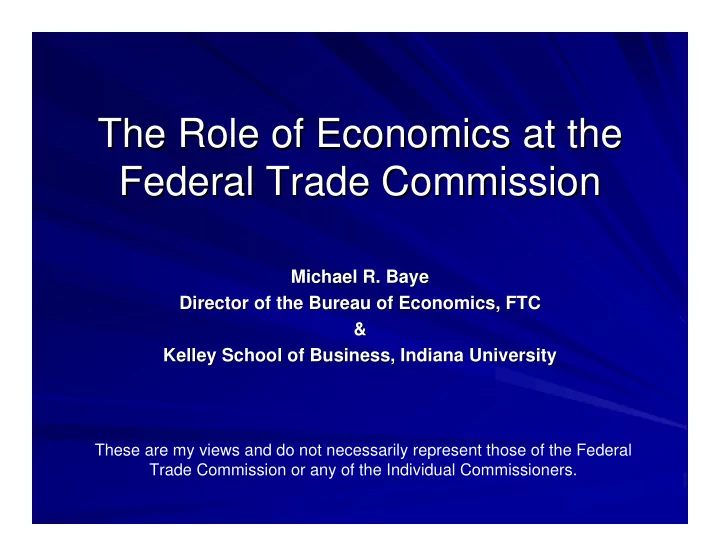

The Role of Economics at the The Role of Economics at the Federal Trade Commission Federal Trade Commission Michael R. Baye Michael R. Baye Director of the Bureau of Economics, FTC Director of the Bureau of Economics, FTC & & Kelley School of Business, Indiana University Kelley School of Business, Indiana University These are my views and do not necessarily represent those of the Federal Trade Commission or any of the Individual Commissioners.
Overview Overview Missions of the FTC Missions of the FTC – Competition (Antitrust) Competition (Antitrust) – – Consumer Protection Consumer Protection – – Public Policy/Advocacy/R&D Public Policy/Advocacy/R&D – In democracies, legislation and public policy In democracies, legislation and public policy rightfully driven by interests of constituents rightfully driven by interests of constituents Important roles for economists Important roles for economists – Voice for Voice for “ “Efficiency," the often silent constituent Efficiency," the often silent constituent – – Identify potential unintended consequences Identify potential unintended consequences – – Identify (and help weigh) costs, benefits and tradeoffs Identify (and help weigh) costs, benefits and tradeoffs –
Dispassionate Economists: Dispassionate Economists: The Butt of Jokes The Butt of Jokes
But… …Efficiencies are Important Efficiencies are Important But Antitrust and Consumer Protection— —and more and more Antitrust and Consumer Protection generally legislation and public policy— — generally legislation and public policy sometimes driven by distributional issues sometimes driven by distributional issues Dividing up an existing pie to protect interests of Dividing up an existing pie to protect interests of – Particular consumers (urban, rural, rich, poor, local, Particular consumers (urban, rural, rich, poor, local, – etc.) etc.) – Particular firms (incumbents, small firms, local firms, Particular firms (incumbents, small firms, local firms, – etc.) etc.) Important for these voices to be heard Important for these voices to be heard …But it also important to hear the voice of But it also important to hear the voice of … efficiencies. If not by economists, by whom? efficiencies. If not by economists, by whom?
Long- -Run Interests of Market Run Interests of Market Long Participants Depend on Efficiencies Participants Depend on Efficiencies Policies advocated by self- -interested interested Policies advocated by self constituents can shrink the size of the pie constituents can shrink the size of the pie – Costs of rent seeking Costs of rent seeking – – Distorted incentives Distorted incentives – – Unintended consequences Unintended consequences – Historical examples Historical examples – Trade wars Trade wars – – Protectionist policies Protectionist policies – – Innovation Innovation – Area of potential future concern Area of potential future concern – Antitrust wars Antitrust wars –
Static vs. Dynamic Effects Static vs. Dynamic Effects Distributional effects not only vary across Distributional effects not only vary across participants at a point in time, but over participants at a point in time, but over time. time. A given constituent may benefit from A given constituent may benefit from policies today, but be harmed in the future policies today, but be harmed in the future And vice versa And vice versa
Role for Economists Role for Economists Identify these sorts of effects – – including including Identify these sorts of effects unintended consequences and efficiencies unintended consequences and efficiencies – so that policymakers and their so that policymakers and their – constituents can take them into account constituents can take them into account
Examples Examples Antitrust: Antitrust: – Oil and Gas Oil and Gas – – Google/DoubleClick Google/DoubleClick – Consumer Protection: Consumer Protection: – Behavioral Advertising Behavioral Advertising – – Fraud and Deception Fraud and Deception – Advocacy/Economic R&D: Advocacy/Economic R&D: – Resale Price Maintenance Resale Price Maintenance – – Mortgage Disclosures Mortgage Disclosures –
Conclusions Conclusions Economists play many roles at the FTC and Economists play many roles at the FTC and around the world around the world Three of our more important roles are Three of our more important roles are – Identifying unintended consequences – Identifying unintended consequences – Ensuring that efficiency considerations are taken into Ensuring that efficiency considerations are taken into – account account – Identifying tradeoffs/Cost Identifying tradeoffs/Cost- -benefit analysis benefit analysis – The fact that economists often focus on these The fact that economists often focus on these three aspects does not mean distributional and three aspects does not mean distributional and other considerations are unimportant. But there other considerations are unimportant. But there are other voices to represent these constituents. are other voices to represent these constituents.
Recommend
More recommend